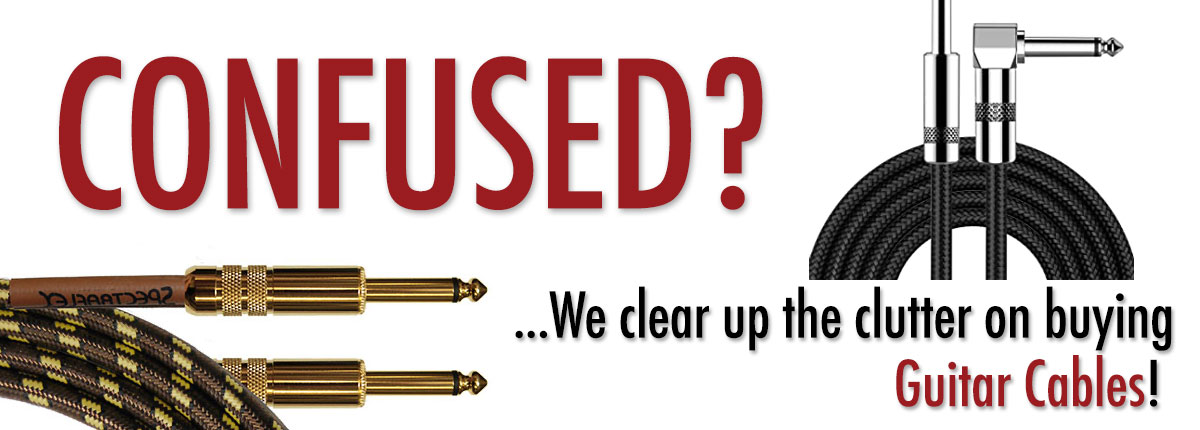
By Ed Malaker
Posted 11/13/2020
If you’re in the market for a new guitar cord, you might have some questions about which brand makes the best. Join us as we take an in-depth look at the different things that make one guitar cable better than the next. We’ll discuss length, materials, capacitance, and more, so you can make an educated choice and make the best purchase.
Cable Construction and Qualities
Here are a few different elements of the guitar cable that you may want to consider before your next purchase.
Length
For many of us, the length of the cable is one of the first things we look for, and it is often our main concern. However, we recommend you get the shortest cord possible for your set-up. You may require a longer cable for live performance, but you can often get by with a much shorter cable at home. Longer cables are messy and more prone to damage than shorter ones because there is more cable to damage.
However, the real reason we want to use the shorter cable is that as a cable gets longer, it creates capacitance. More capacitance will remove the highs from your guitar signal and leave you with a dull, muddy tone.
Shielding
When considering your choice of the best guitar cable, one of the most important things to look for is its shielding. Shielding is often little more than thin aluminum foil attached to Ground, but it can also be a braided wire. Shielding is important to prevent static and other noise from entering the signal between the guitar and the amplifier. It does so by creating a type of Faraday cage that grabs radio frequency interference and shuttles it off to Ground.
Most guitar cables that you purchase at a guitar store have shielding, but many of the cables that are thrown in as a bonus when you buy a new piece of gear are not. You may not notice an unshielded cable at first, but over time you will begin to wonder why there is so much static in your signal. Another problem that we often see is that people repair a broken cable and forget to reconnect the shield.
Wires
Another thing to think about when considering the best guitar cable is the wiring. Often it’s copper, but it can sometimes be aluminum or nickel. We recommend looking for brands that use copper because it is more conductive, which can reduce the capacitance created. If the shielding is a braided metal, it is almost always aluminum.
A thicker wire does conduct more electricity, but it’s important to remember that the guitar doesn’t create much electricity, so there’s no need to buy into the thick wire hype. Thicker wire is better for power amps and speaker wire, where large amounts of electricity do flow.
Casing
In our search for the best guitar cable, we’ve seen many types of casing material, but most are a flexible rubber or plastic. Cloth cables are also becoming more popular. The type of casing you get is personal taste, and the different materials have little effect on the tone that they create. Most materials are very durable.
Cable Ends
One of the biggest things that guitar cable manufacturers market is ‘special ends’. Most commonly, gold-plated ends. The idea is that the gold plating will help conduct the electricity better, leaving the guitar and entering the amp. Many computers and other high-end gear utilize plenty of gold connections in their internal components.
However, we don’t recommend gold-plated cables for the following reasons:
- Gold plating adds to the price of the cable.
- It’s extremely thin and often wears off quickly.
- It doesn’t improve the tone, and if it does, it’s extremely minor.
- It can cause some metals to corrode, mainly aluminum. When gold is in contact with aluminum, it creates corrosion, which will reduce conductivity resulting in the opposite of the cable’s intention.
- The guitar jack is usually steel, but the amplifier, foot pedals, mixing boards, etc. may use jacks that contain aluminum, so it’s better to avoid gold plating completely.
Summary
There are many brands of cable available, and everyone has their own favorite. We feel that the brand doesn’t matter. What does matter is that it’s shielded, as short as possible, and doesn’t have gold ends. We like the cloth sleeves because they seem easier to wrap and don’t get as dusty-looking over time.
If you have found this in-depth look at the different aspects of guitar cables helpful, please feel free to share this guide on Facebook and Twitter. For more articles on guitar electronics, visit humbuckersoup.com.
